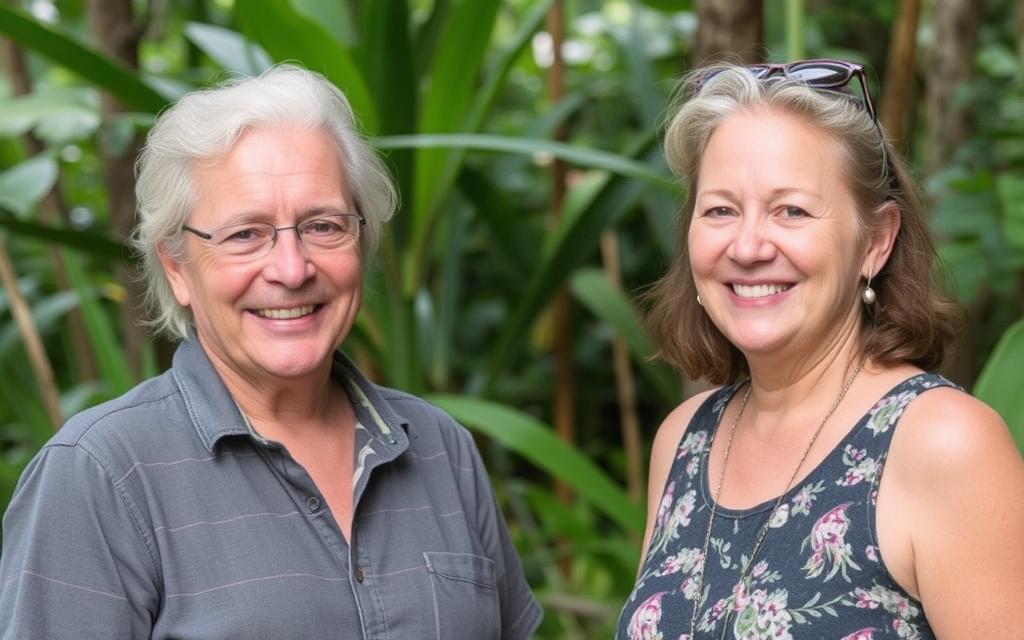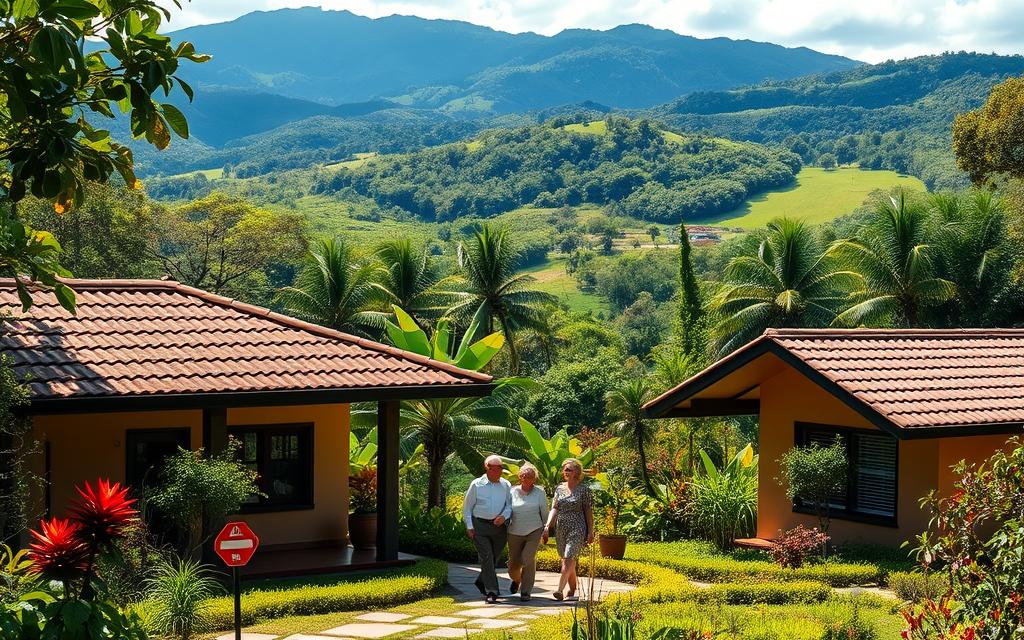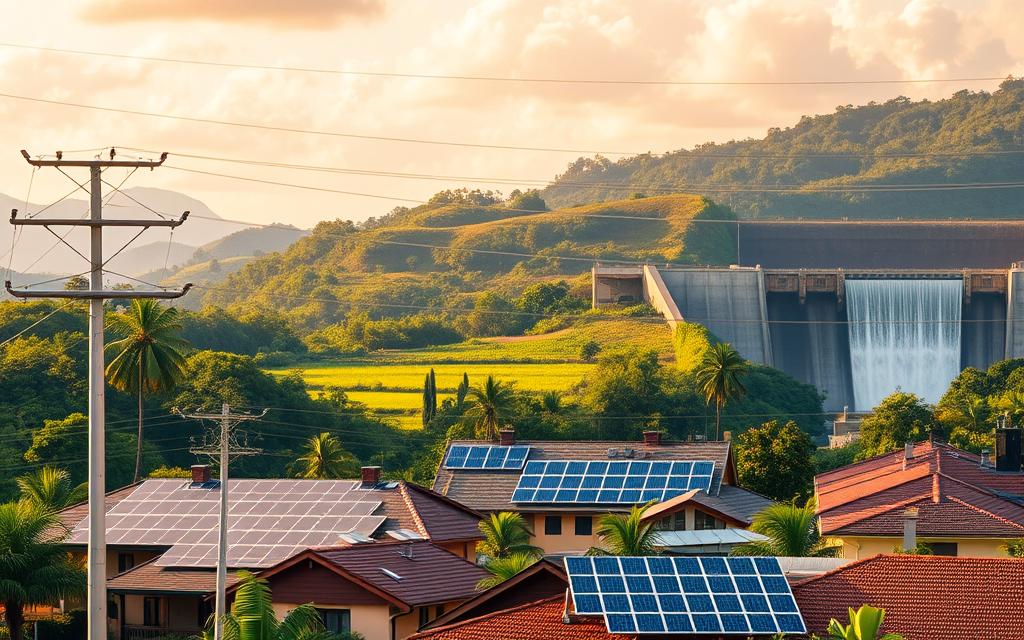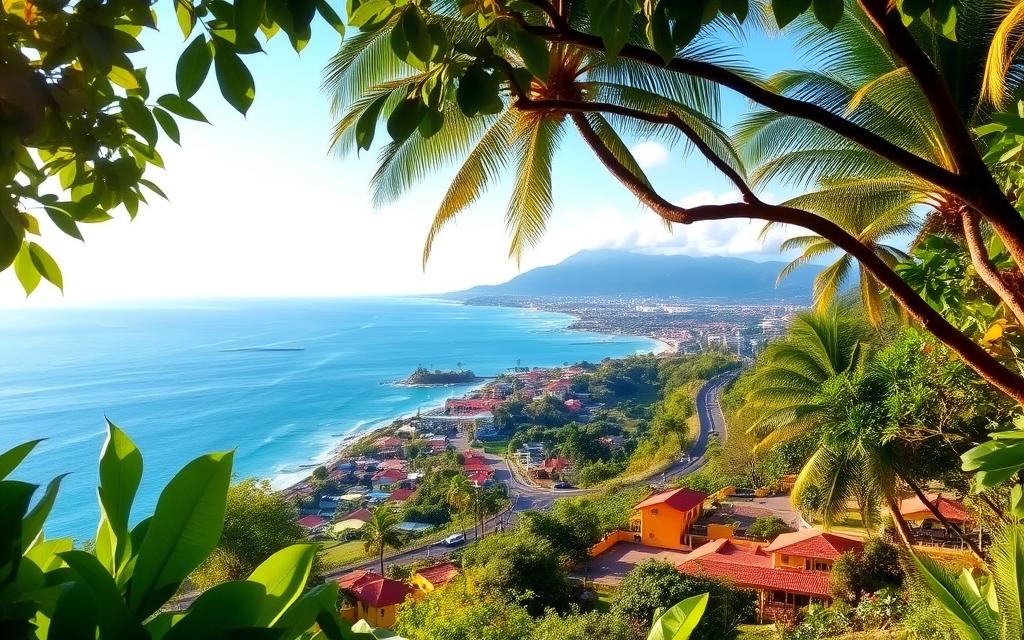Cost of Living for Pensionado Residents in Costa Rica

Costa Rica has emerged as a haven for retirees seeking a high-quality lifestyle at an affordable retirement income. With its lush landscapes, stable democracy, and modern amenities, it's no wonder that many are choosing to spend their golden years here.
The average monthly cost of living in Costa Rica is $781 for one person, 27% lower than in the United States. This significant difference makes Costa Rica an attractive destination for those looking to stretch their retirement income further without sacrificing their lifestyle.
As we explore the specifics of living in Costa Rica, we'll examine the costs, residency requirements, and quality of life considerations that make it an ideal location for pensionados. Our goal is to provide a comprehensive overview of what retirees can expect when making Costa Rica their home.
The Pensionado Residency Program in Costa Rica
The Pensionado Residency Program in Costa Rica is designed specifically for retirees, providing a hassle-free path to residency. This program is particularly appealing to individuals with a steady pension income, making Costa Rica one of the most accessible retirement destinations in Latin America.
Eligibility Requirements and Income Minimums
To qualify for Costa Rica's temporary residence permit for retirees, applicants must have a clean criminal record and receive a pension or retirement income of more than $1,000 per month from a verifiable pension source. This minimum income requirement is significantly lower than many other countries' retirement visa programs, making Costa Rica an attractive option.
Application Process and Documentation
The application process for the Pensionado Residency Program involves several key steps and required documents. Applicants must provide proof of income, undergo criminal background checks, and submit birth certificates, among other essential paperwork that must be apostilled and translated. The process typically takes several months from submission to approval.
Spouses and dependent children can be included in the application, making the Pensionado Residency Program a family-friendly option for retirees. After three years of living in Costa Rica, applicants may be eligible for permanent residence, offering a long-term solution for those who wish to make Costa Rica their home.
Cost of Living for Pensionado Residents in Costa Rica

Understanding the cost of living in Costa Rica is crucial for pensionado residents to plan their retirement effectively. The cost of living can vary significantly based on factors such as location, lifestyle, and personal choices. However, overall, Costa Rica offers a relatively low cost of living compared to many North American countries.
Average Monthly Expenses Breakdown
The average monthly expenses for pensionado residents in Costa Rica can range from $1,600 to $3,000, depending on whether you're single or a couple. Here's a breakdown of typical expenses: Rent for a one-bedroom apartment in the city center costs around $662, while outside the city center, it drops to $466. Utilities average $85.84 per month. A monthly public transportation pass is approximately $41.76, and a gym membership costs about $54.87. Dining out for two in a mid-range restaurant costs around $58.90.
Comparison with North American Costs
When comparing the cost of living in Costa Rica to North America, the savings become apparent. Consumer prices in Costa Rica are approximately 38% lower than in the United States. This difference is even more pronounced in certain categories such as housing and food. For instance, rent for a three-bedroom apartment outside the city center can be as low as $900, significantly less than what one would pay in major U.S. or Canadian cities. This reduction in living expenses allows pensionados to maintain their accustomed lifestyle while spending less.
Housing Expenses for Retirees
When considering retirement in Costa Rica, understanding housing expenses is crucial for budgeting. Housing is a significant expense for most families, usually accounting for at least 25% of their income. Fortunately, the average rent in Costa Rica is 65% less than in the U.S., offering potential savings for retirees.
Rental Prices in Popular Expat Areas
Rental prices in Costa Rica vary significantly depending on the location. Popular expat areas like Tamarindo, Escazú, and Heredia offer a range of housing options. In Tamarindo, a beachfront town, rental prices can be higher due to its popularity among tourists and expats. For example, a one-bedroom apartment in Tamarindo might cost between $600-$1,000 per month.
In contrast, areas like Escazú and Heredia, located in the Central Valley, offer more affordable options, with one-bedroom apartments ranging from $400-$700 per month. Simpler homes that are a short drive from the beach can also be quite affordable, providing a cost-effective alternative for retirees.
Property Purchase Considerations and Costs
For retirees considering a more permanent move, purchasing property in Costa Rica can be a viable option. The process involves understanding the legal requirements and associated costs, including property taxes and potential investment returns. Costa Rica offers relatively low property taxes compared to North America, making it an attractive option for retirees.
It's also important to consider property management, maintenance costs, and security when purchasing a home. Working with a reputable real estate agent can help navigate these complexities and ensure a sound investment.
Food and Dining Costs

The cost of food and dining in Costa Rica is a significant factor for retirees when planning their retirement budget. Fortunately, Costa Rica offers a range of affordable dining options, from local markets to restaurants, making it an attractive destination for pensionados.
Local Markets and Grocery Shopping
One of the joys of living in Costa Rica is the abundance of fresh produce available at local farmers' markets, known as "ferias." These weekly markets offer a wide variety of fruits and vegetables at incredibly low prices. For example, you can buy as much produce as you can carry for about $20-30. Shopping at these markets not only saves money but also provides an opportunity to experience the local culture. For more information on settling into Costa Rican life, you can visit this resource on pensionado visas.
Restaurant Dining Options and Prices
Dining out in Costa Rica is also affordable, with meals typically costing about half of what you would pay in a North American city. The standard 10% tip is usually included in the menu price, making it easy to budget for meals. From local "sodas" (small family restaurants) to upscale international establishments, there's a wide range of dining options available to suit various tastes and budgets.
Overall, Costa Rica's food and dining landscape offers retirees a great balance of affordability and variety, contributing to a comfortable and enjoyable lifestyle.
Transportation Expenses
Costa Rica offers various transportation options, each with its own set of costs and benefits. For pensionados, understanding these expenses is crucial for effective budgeting and maintaining their quality of life.
Vehicle Ownership Costs
Owning a vehicle in Costa Rica comes with significant expenses, primarily due to the high import duties. Every vehicle registered in the country is subject to an import duty of 60-80% of its value, nearly doubling the purchase price compared to North American markets. Additionally, pensionados should consider ongoing expenses such as fuel, which is about $2 per gallon more expensive than in the U.S., maintenance, insurance, and annual registration fees (marchamo).
Public Transportation Options
On the other hand, Costa Rica has an extensive and affordable public transportation system, including buses, taxis, and ride-sharing services like Uber. These options can significantly reduce transportation costs for pensionados who do not need the flexibility of owning a vehicle. For those living in popular expat areas, public transportation can be a convenient and cost-effective alternative. According to recent studies, utilizing public transport can help retirees save on overall expenses.
Healthcare Options and Costs
Costa Rica offers a robust healthcare system for its residents, including pensionados, through its national health care program known as the Caja. The Caja Costarricense de Seguro Social (CCSS) is a universal healthcare system that pensionados can join for approximately 9-11% of their reported monthly income.
Public Healthcare System (CCSS/Caja)
The Caja system provides comprehensive coverage, including visits to local clinics or hospitals and some prescriptions, often at no additional cost once enrolled. This system is known for its affordability and good quality of care, making it an attractive option for retirees on a fixed income.
Private Health Insurance Plans
While the Caja system is highly regarded, some pensionados with higher incomes may prefer private health insurance for access to a broader range of private clinics, doctors, and hospitals. Providers such as INS Seguros, Mapfre Seguros, and BlueCross BlueShield offer various plans that cater to different needs and budgets.
For those considering private insurance, it's essential to compare the costs and benefits, including out-of-pocket expenses for common medical procedures. Many expatriates find that combining the public Caja system with private insurance provides the best balance of affordability and convenience. To learn more about the Pensionado Program in Costa Rica and its benefits, including healthcare options, visit Jaros CR.
Utility and Service Expenses

Understanding utility and service expenses is crucial for pensionados planning to reside in Costa Rica. The country's tropical climate and the availability of services significantly influence these costs.
Electricity, Water, and Internet Costs
In Costa Rica, electricity can be more expensive per kilowatt hour compared to the U.S. However, the need to only cool homes, not heat them, can lead to savings on energy costs. Water is safe to drink and relatively inexpensive, eliminating the need for bottled water. Internet and cable television services are widely available and cost less than in North America. Typical utility costs, including electricity, water, internet, and cable/satellite TV, range between $100 to $200 per month for a modest home.
Household Services and Maintenance
Household services such as cleaning, gardening, and property maintenance are significantly more affordable in Costa Rica than in North America. This affordability can greatly reduce the overall cost of living for pensionados. By hiring local services, retirees can enjoy a comfortable lifestyle without the high costs associated with maintaining a home in many Western countries.
Tax Benefits and Considerations
Pensionados in Costa Rica can benefit from a territorial tax system that excludes foreign-sourced income from taxation. This means that income from sources such as US Social Security payments, pensions, or retirement plans is generally not subject to Costa Rican taxes.
Costa Rican Tax Obligations for Pensionados
Costa Rica taxes income generated within the country. If you earn rental income, interest, or other revenue from Costa Rican sources, it will be subject to local taxes. Tax rates range from 0% to 25%, with interest, dividends, capital gains, and rental income typically taxed at 15%.
U.S. Tax Reporting Requirements for Expats
Moving to Costa Rica does not absolve U.S. citizens of their tax filing obligations. American expatriates must file an annual federal tax return if they meet the minimum income reporting requirements. Important forms to consider include the FBAR and Form 8938.
To minimize global tax burden, pensionados should consider tax planning strategies that ensure compliance with both Costa Rican and U.S. tax laws. Consulting a tax advisor specializing in expat services can provide personalized guidance.
Popular Retirement Destinations and Their Cost Profiles

Costa Rica has become a magnet for retirees, offering a diverse array of living options that cater to various lifestyles and budgets. The country's regions offer unique blends of lifestyle, amenities, and cost profiles, making it essential for pensionados to choose wisely based on their preferences and financial situation.
Central Valley
The Central Valley, including areas like Escazú and Heredia, offers a cooler climate and proximity to major healthcare facilities and urban amenities. Escazú, in particular, is known for its modern amenities, including great shopping, dining, and medical care, alongside gorgeous mountain views. The cost of living in these areas can vary significantly based on factors like housing and lifestyle choices.
Coastal Areas
Coastal towns such as Tamarindo, Quepos, and Dominical offer a beach lifestyle with varying costs. Tamarindo, with its large expat community, provides premium access to the Pacific Ocean and activities like surfing and fishing. Quepos, as the gateway to Manuel Antonio National Park, maintains a laid-back atmosphere despite being a tourist attraction. The cost of beachfront living can be higher in these areas, but they offer a unique lifestyle that many retirees find appealing.
Mountain Regions
Mountain regions, including San Ramón and the Southern Zone, offer more affordable housing options with spectacular views and temperate climates. These areas are ideal for those looking for a quieter, more secluded lifestyle while still enjoying the natural beauty and amenities that Costa Rica has to offer.
Ultimately, the choice of retirement destination in Costa Rica depends on balancing lifestyle preferences with cost considerations. By understanding the cost profiles of different regions, pensionados can make informed decisions that suit their needs and budget.
Sample Monthly Budgets for Different Lifestyles
To live comfortably in Costa Rica, retirees need to carefully plan their monthly expenses based on their lifestyle choices. The cost of living can vary significantly depending on whether one prefers a modest or luxurious lifestyle.
Budget Living ($1,600-$2,000)
A budget of $1,600 to $2,000 per month can support a comfortable but modest lifestyle in Costa Rica. This budget can cover rent for a one-bedroom apartment in a town like Tamarindo or San José, groceries from local markets, and occasional dining out. Transportation costs can be kept low by using public transport or owning a used vehicle. Leisure activities such as hiking, visiting local attractions, or joining expat groups can also be enjoyed within this budget.
Comfortable Living ($2,500-$3,500)
For those with a budget of $2,500 to $3,500 per month, Costa Rica offers a more comfortable lifestyle. This income level allows for renting a larger home or apartment, possibly in a gated community, and enjoying more frequent dining out at mid-range restaurants. It also permits more travel within the country, participation in hobbies, and potentially owning a newer vehicle. Utilities, internet, and other services are also more affordable at this level.
By understanding these budget categories, pensionados can better plan their expenses to live comfortably in Costa Rica, enjoying the country's natural beauty and expat communities without undue financial stress.
Quality of Life Considerations Beyond Costs
The quality of life in Costa Rica extends far beyond mere cost considerations, offering a holistic retirement experience. For pensionados, the country's appeal lies not only in its affordability but also in its high standard of living, rich cultural heritage, and stunning natural beauty.
Healthcare Quality and Accessibility
Costa Rica's healthcare system is renowned for its excellence, providing pensionados with access to high-quality medical care at a relatively low cost. The country's medical tourism industry is a testament to its reputation for affordable and superior healthcare services. With modern facilities and English-speaking medical professionals, pensionados can feel confident in the care they receive. For more information on applying for residency, visit this resource.
Social Life and Expat Communities
Costa Rica's vibrant expat communities offer pensionados a rich social life, with numerous opportunities to engage in cultural activities, join clubs, and participate in community events. The country's diverse culture, influenced by Spanish, indigenous, and Afro-Caribbean traditions, provides a unique and welcoming environment for retirees. By integrating into local communities and leveraging the country's natural amenities, pensionados can maximize their quality of life in Costa Rica.
Conclusion
The allure of Costa Rica for pensionados lies in its ability to provide a high quality of life at an affordable cost, without sacrificing the comforts and security that matter most. With its beautiful landscapes, modern healthcare, and favorable tax environment, Costa Rica offers an attractive package for retirees.
By considering factors such as housing, healthcare, and daily expenses, pensionados can enjoy a comfortable lifestyle in Costa Rica. We invite retirees to experience the pura vida philosophy that makes Costa Rica so appealing, and to explore the many options available for making this country their home.


